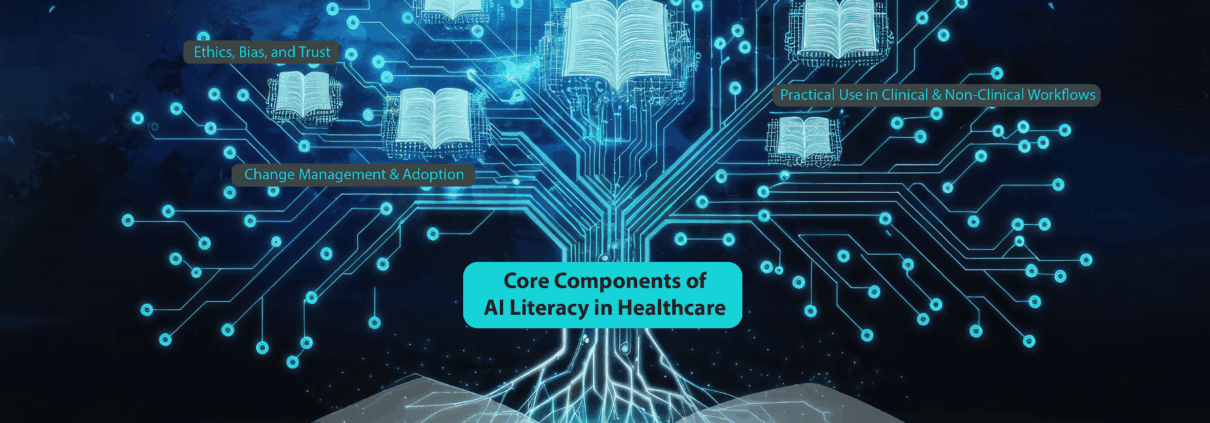Why AI Literacy Matters for All Healthcare Staff: Clinical and Non-Clinical
Rohit Mahajan
A recent study published by the World Economic Forum (WEF) says that to overcome challenges hindering meaningful adoption of AI and to realize AI’s full potential in healthcare, one of the six pivotal shifts for public and private leaders proposed by the report is equipping health leaders and clinicians with the necessary AI literacy to make informed strategic decisions that align with their vision.
A lack of fundamental knowledge about AI among leaders and decision-makers sparks societal concerns and hinders progress with AI. A comprehensive upskilling of leaders helps them grasp AI’s strategic purposes and foundational digital principles more effectively. Thus, enabling informed decision-making, effectively interrogating AI solutions, and building trust across the healthcare ecosystem. An enhanced AI literacy can also help health workers and patients trust and adopt AI tools, showing that the technology is here to complement, not replace, healthcare professionals.
The rapid transformation of healthcare and the life sciences by AI, encompasses clinical decision-making, drug discovery, and patient engagement, requires more than just technology; it necessitates an AI-literate workforce across executive leadership, technical teams, clinicians, researchers, and business functions.
In the following section, I discuss why introducing AI literacy among the clinical and non-clinical workforce matters:
AI Literacy for Clinical Workforce
Clinical workforce, including doctors, nurses, and technicians, requires AI literacy to ensure patient safety, deliver high-quality care, and adapt to the evolving medical technology. Key reasons include:
- Enhancing diagnostic accuracy: AI algorithms can analyze vast medical imaging datasets, helping clinicians detect subtle patterns that may be imperceptible to the human eye. AI-literate clinicians can interpret and utilize these AI-generated insights more effectively to enhance diagnostic precision and efficiency.
- Strengthening clinical decision-making: AI-powered clinical decision support systems provide evidence-based recommendations and real-time alerts for patients at risk. An understanding of how these systems arrive at their conclusions allows clinicians to make informed decisions and better personalize treatment plans.
- Reducing burnout: AI tools automate time-consuming administrative tasks, such as documentation, transcription, and EHR management. AI-driven automations free up clinicians to focus on direct patient care, potentially reducing burnout and improving job satisfaction.
- Maintaining ethical standards: Clinical staff must recognize the potential for bias in AI algorithms, which can perpetuate or even amplify existing health disparities. AI literacy enables them to assess tools critically, protect patient privacy, and ensure fair, equitable care for all populations.
- Ensuring safety and accountability: Over-reliance on AI without understanding its limitations can lead to diagnostic errors and patient harm. An AI-literate workforce is better equipped to oversee AI applications, check for system failures or “hallucinations,” and ensure accountability for their use.
AI literacy for non-clinical workforce
Non-clinical workforce, including administrative assistants, IT personnel, and managers, can use AI to automate routine processes, manage resources efficiently, and securely handle sensitive data in the following manners:
- Streamlining operations: AI-driven systems can efficiently manage scheduling, process claims, and handle billing, thereby reducing manual workloads and minimizing errors. Non-clinical workers must understand how these systems work to implement and effectively oversee them.
- Enhancing financial performance: Utilize AI for tasks such as revenue cycle management and fraud detection. A literate team can leverage AI analytics to identify inefficiencies, control costs, and maximize revenue, ultimately contributing to the organization’s financial health.
- Enhancing data security: AI systems manage and process vast amounts of sensitive patient information. Non-clinical staff with AI literacy can understand the security risks and are equipped to protect data through access controls, encryption, and compliance with regulations such as HIPAA, SoC2, FHIR, and more.
- Optimizing resource allocation: AI can help forecast patient demand and staffing needs by analyzing historical data and trends. Administrative and managerial staff should be AI literate to effectively use these predictive tools for scheduling and resource management, thereby preventing both under- and over-staffing.
- Enabling interdisciplinary collaboration: The successful implementation of AI requires collaboration between technical developers and health system staff. AI-literate non-clinical employees can better communicate organizational needs and clinical insights to technical teams, ensuring that AI solutions are user-friendly and clinically relevant.
Why AI Literacy Matters in Healthcare
For AI to fulfill its promise as a transformative partner in healthcare, clinical and non-clinical professionals must go beyond simply using the technology without really understanding it. Actual adoption requires a workforce that recognizes both the strengths and the limitations of AI, and knows how to apply it responsibly, ethically, and effectively.
Building AI literacy across healthcare organizations is not just a technical imperative; it’s a cultural one. When executives, clinicians, researchers, technical teams, and business leaders share a common understanding of AI and the business goals of using it, the results go beyond improved workflows. They foster innovation, enhance patient experiences, and ensure that AI is embedded in a way that is trustworthy and sustainable.
An AI-literate workforce enables:
- A shared foundation of understanding across roles and disciplines.
- Responsible integration of AI into areas such as genomics, clinical workflows, and business operations.
- Empowered technical teams who can leverage modern AI coding tools for rapid innovation.
- A culture of experimentation through collaborative forums like hackathons and challenges.
- Continuous knowledge-sharing that keeps pace with AI’s rapid evolution.
AI literacy is not about teaching everyone to code; it is about equipping healthcare professionals to ask the right questions, make informed decisions, and embrace AI as a partner in improving outcomes. In this way, literacy becomes the foundation for trust, adoption, and transformation.


